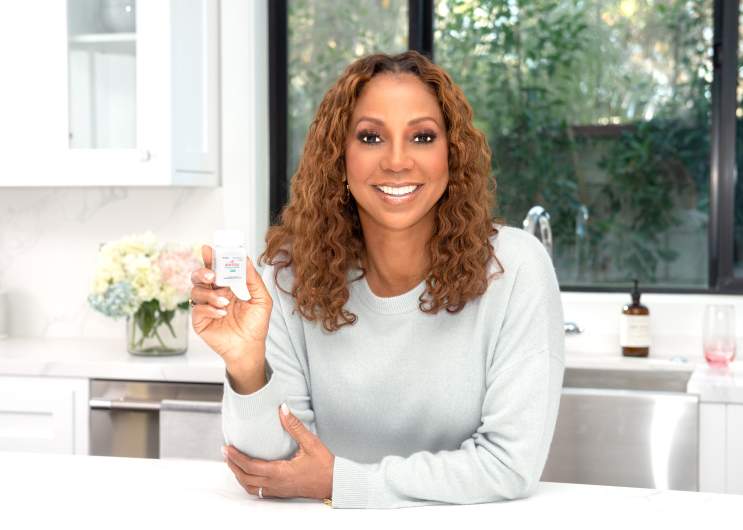
Heavy/Getty Holly Robinson Peete
Holly Robinson Peete says she’s always been an “open book,” so she’s not going to hide a recent diagnosis that some people feel too ashamed or embarrassed to share. The Hallmark Channel actress recently signed on as a spokesperson for Urovant Sciences’ new “Time to Go” education initiative about Overactive Bladder (OAB), a condition she was surprised to be diagnosed with, even though her frequent bathroom breaks had become a running joke on the sets of her movies.
“I didn’t know what was going on,” Peete told Shondaland in a February 2023 interview. “I just knew I had to go to the bathroom way too much, more frequently than I ever had to before.”
Now the actress is opening up about what she’s learned and what she’s doing to treat the condition.
Holly Robinson Peete Shares How OAB Impacted Her on Hallmark Movie Sets

Urovant SciencesHolly Robinson Peete holding her prescription for OAB
When Peete, 58, first experienced symptoms of OAB, she just thought it was a sign of aging or a side effect of menopause, she told Black Enterprise, so she didn’t seek out help for years.
According to Mayo Clinic, OAB causes “a sudden urge to urinate that’s difficult to control,” typically at least eight times per 24 hours. Patients are also likely to wake up at least twice a night to use the bathroom.
That kind of disruption is hard for anyone, but was especially not conducive to Peete’s work on movie sets, particularly since Hallmark’s 15-day film shoots are so intense. Filming Christmas movies was the worst, she told Shondaland, because she had to be bundled in layers of winter clothes and always worried about the location of the nearest restroom.
Then she began noticing that assistant directors had given her the code name “10-1,” which is a common film set term used when an actor needs to leave quickly to use the bathroom. Peete told Shondaland she did not want to have a reputation of being “the girl that got to go to the bathroom all the time!”
So Peete finally went to a doctor, she said, where she was surprised to learn about OAB — and that she had it. She told Essence that her doctor recommended a prescription medication called GEMTESA, which is for adults with symptoms including leakage, urgency, and frequency.
“I experienced OAB symptoms for years before talking to my doctor about potential treatment options, and I wish I had sooner,” she told Essence, adding that she’s noticed a marked improvement in recent months, which has lessened her anxiety.
“I would always have to figure out where the bathroom was,” she told MSN in January. “That was the first thing I would ask. Any restaurant I went to, any trip I would go on, I would always have to sort of pre-plan about where the bathroom was.”
Holly Robinson Peete Says Diagnosis Reminded Her to Take Better Care of Herself

GettyHolly Robinson Peete poses with her family on her just unveiled Hollywood Walk of Fame Star in June 2022.
In addition to feeling relieved she no longer has to worry so much about her bladder while filming, Peete is also grateful that her diagnosis reminded her not to wait to advocate for herself anymore.
“All we have is our health,” she told Shondaland. “When you’re a busy mom or you’re working, especially Black women, we keep pushing through. We keep making things happen. We keep riding for everybody else and putting ourselves last in line. It’s important to put yourself in front.”
As for opening up about the sometimes embarrassing diagnosis, Peete said this was no time for her to stop being honest and outspoken about matters she cares about.
“I have always been an open book,” she told Ebony. “I’ve shared my story about my family and special needs, and just things that we’ve been through.”
She added that she had never heard of OAB until she was diagnosed, so she’s hoping speaking out will help others learn about it, too.
“If my conversation can open up a conversation for someone else, then that’s a great thing,” she told MSN.
According to Prevention magazine, over 33 million Americans suffer from OAB symptoms. Some doctors suggest dietary adjustments and bladder and pelvic floor training, like kegel exercises, before prescribing medication to their patients.